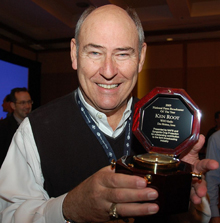 Just a couple of weeks ago, former NAFB president Ken Root was grinning from ear to ear as he accepted the coveted Farm Broadcaster of the Year award from the National Association of Farm Broadcasting. This week, he was unceremoniously let go by a company that has a reputation for not appreciating the work of talented and respected farm broadcasters. But Ken is still smiling!
Just a couple of weeks ago, former NAFB president Ken Root was grinning from ear to ear as he accepted the coveted Farm Broadcaster of the Year award from the National Association of Farm Broadcasting. This week, he was unceremoniously let go by a company that has a reputation for not appreciating the work of talented and respected farm broadcasters. But Ken is still smiling!
On his Facebook page, Ken wrote: I’m in the unemployment line! Clear Channel terminated my employment yesterday afternoon. I finished my reports, packed my belongings under supervision and toured the building shaking hands with my former co-workers. I am greatly relieved and moving on.
This is not the first time that Clear Channel has terminated a highly respected farm broadcaster. While the company owns several properties – both networks and stations – that serve the agricultural community, they just don’t seem to understand the importance of that. Ken is a wonderful person, a fabulous on-air talent, and a great farm broadcaster. His audience in the WHO listening area is the loser here because he not only informed, but entertained – and not just farmers, but the general public as well.
Best of luck, Ken. You are an original and one of the very best in the business.


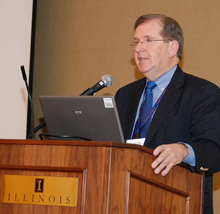 Here’s another report from the
Here’s another report from the 
 Here’s the moon over the Atlantic as seen from my hotel room here in El Jadida. Last night we met with the local area USGC representatives and ate a very good Moroccan meal. I’ve never eaten lamb that tasted so good. We learned what a growing market Morocco is for U.S. grain and will be seeing evidence of that in our meetings through the end of the week.
Here’s the moon over the Atlantic as seen from my hotel room here in El Jadida. Last night we met with the local area USGC representatives and ate a very good Moroccan meal. I’ve never eaten lamb that tasted so good. We learned what a growing market Morocco is for U.S. grain and will be seeing evidence of that in our meetings through the end of the week.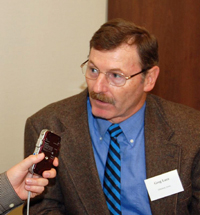 Participants from this year’s AGMasters Conference had the privilege to gain insight on the efforts in genetics and agronomy efforts to increase corn yields. Greg Luce from Pioneer Hybrids provided coming news on improvements in corn production. With a growing population and growing demand of food production, farmers have to realize they need to produce more on what land we already have. This provides a great demand and challenge for producers in agriculture to increase our yields to feed the world.
Participants from this year’s AGMasters Conference had the privilege to gain insight on the efforts in genetics and agronomy efforts to increase corn yields. Greg Luce from Pioneer Hybrids provided coming news on improvements in corn production. With a growing population and growing demand of food production, farmers have to realize they need to produce more on what land we already have. This provides a great demand and challenge for producers in agriculture to increase our yields to feed the world. 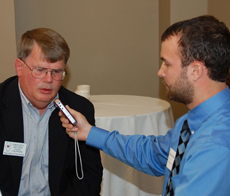 I am working with a number of talented young student bloggers covering the
I am working with a number of talented young student bloggers covering the 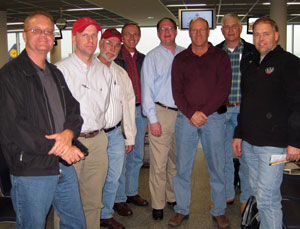 Here is the 2009
Here is the 2009 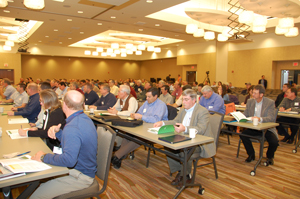 The inaugural AGMasters Conference is underway at the University of Illinois in Champaign-Urbana and there is a good crowd on hand, despite the fact that many farmers around the state are still out harvesting corn. This event is a new format for a conference that has a 60 year history at the university. Once upon a time, it was called “Spray School” – but it has evolved into so much more.
The inaugural AGMasters Conference is underway at the University of Illinois in Champaign-Urbana and there is a good crowd on hand, despite the fact that many farmers around the state are still out harvesting corn. This event is a new format for a conference that has a 60 year history at the university. Once upon a time, it was called “Spray School” – but it has evolved into so much more. I talked with one of the co-chairs, Mike Gray, an entomologist with the Department of Crop Sciences. Mike says the organizers of the conference decided to move to the beautiful new I Center this year and have it in December instead of January. “Who would have known with this late harvest that we would have some issues surface because of that,” he said.
I talked with one of the co-chairs, Mike Gray, an entomologist with the Department of Crop Sciences. Mike says the organizers of the conference decided to move to the beautiful new I Center this year and have it in December instead of January. “Who would have known with this late harvest that we would have some issues surface because of that,” he said.